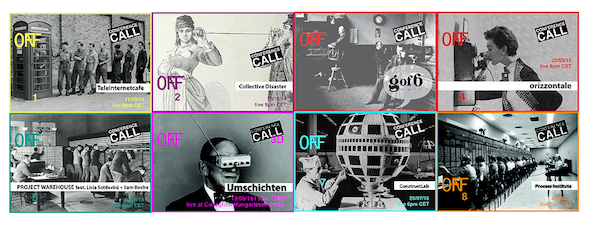Article by Alison Hugill in Berlin; Monday, Aug. 03, 2015

Experimental design collective ON/OFF has initiated a series of Conference Calls, to investigate the recent proliferation of art and architecture collectives worldwide. Following the nomination of 18-member-strong, London-based collective Assemble for the 2015 Turner Prize, there’s been a renewed media interest in the fruits of transdisciplinary collaboration. Whether as a response to economic crisis or a more radical desire for alternatives, many in creative fields have eschewed 9-to-5 office work in favour of more collaborative working environments. The Conference Calls are informal interviews, based on a set of questions that hope to reveal the impetus behind this turn.
All of the interviewed groups are working on public space initiatives, and tend to have members scattered across the globe. They are often without a fixed headquarters and, at least in theory, horizontally organized. ON/OFF’s Conference Calls replicate the modes of communication most often used by contemporary collectives, by broadcasting a typical Google Hangout meeting live on YouTube. The 80s corporate tone of the series’ title points to an inherent irony, underpinned by a dangerous potential. The parallels between this world of adhoc design and participatory actions, and the traditional office environment are ostensibly few, yet the precarious nature of work in all sectors has led to a confusing intermixture of work and non-work, blurring the lines between so-called ‘collaborative’ projects and exploitative pseudo-jobs. By questioning the nature of collective practices, the Conference Calls seek to expose what it is that drives – or, indeed, repels – young artists, architects and designers today.
The latest Conference Call produced a provocative conversation between ON/OFF and public art collective Process Institute. The Process Institute was founded in 2010 by Catherine Grau, Irene Izquierdo, Zoe Kreye, and Carlos Leon-Xjimenez. While all members completed post-graduate studies together at the Bauhaus University in Weimar, the collective was formed in Berlin. They joined forces as a solution to supporting public practices, working without a permanent space or consistent support systems. Interrogating temporality and mobility as the contemporary answer to sustain culture, they aimed to “initiate an invested exploration of the possibilities of this phenomenon.” Their initial project ‘How to Exist’, produced with Art Transponder Berlin, posed concrete questions about how to parasite spaces, collaborate with other institutions, and what kind of infrastructures are needed in contemporary art-production, as well as exploring more deeply the issues of adaptation, appropriation, migration, and how to remain rooted while mobile. The conversation with ON/OFF delved into similar themes, touching on the changing definitions that result from this temporality and mobility, and the importance of a shared politics in the formation of collective practices.
Past Conference Calls have included online interviews with Orizzontale, a Rome-based architecture collective focused on DIY architecture for common spaces, Gang of Six, an architectural “design & make” collective based in Berlin, Brighton, Bristol, Copenhagen, and London, and Collective Disaster, a group exploring new and collaborative ways out of disasters. In May of this year, ON/OFF projected their live Conference Call with Umschichten on the facade of the Hungarian Theatre in Mitte.
___________________________________________________________________________________
Additional Information
ON/OFF
“Conference Call” – Online Series
___________________________________________________________________________________



















